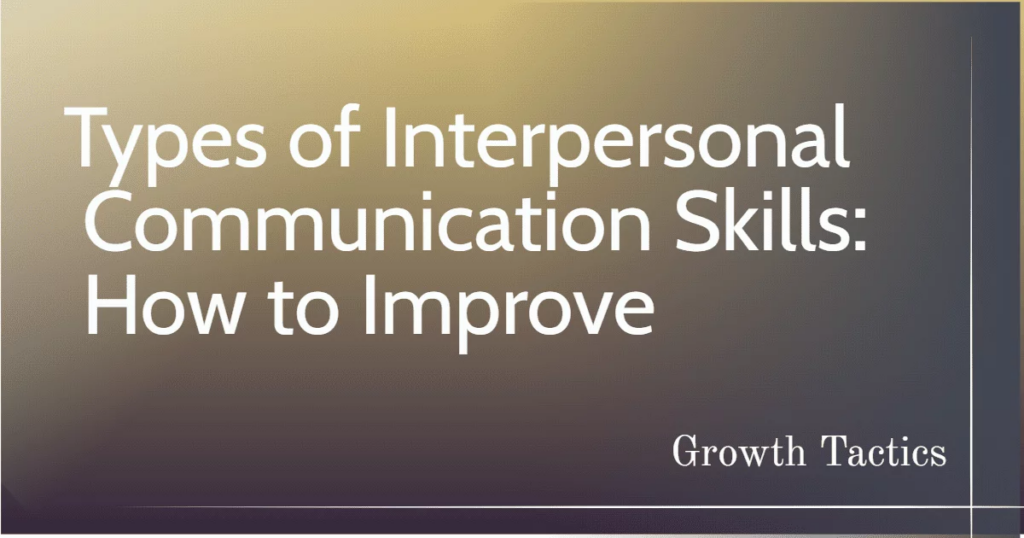Developing Effective Communication Skills to Improve Interpersonal Relationships
Effective communication is the cornerstone of successful interpersonal relationships, fostering understanding, collaboration, and conflict resolution. Whether in personal or professional settings, the ability to convey thoughts clearly, listen actively, and respond appropriately can significantly enhance the quality of interactions. This post delves into strategies for developing communication skills that can improve your interpersonal relationships.

1. The Importance of Effective Communication
Before diving into the strategies, it’s crucial to understand why effective communication is essential for interpersonal relationships. Communication allows individuals to share information, express emotions, and articulate needs. It is the bridge that connects people, enabling them to build trust, resolve conflicts, and collaborate successfully.
In the absence of effective communication, misunderstandings can arise, leading to conflicts and strained relationships. Therefore, improving communication skills is not just an optional enhancement but a necessity for maintaining healthy and productive relationships.
2. Active Listening
What is Active Listening?
Active listening involves more than just hearing the words spoken by the other person. It requires paying full attention, understanding the message, and responding thoughtfully. This practice ensures that the speaker feels heard and valued, fostering a sense of mutual respect and understanding.
How to Practice Active Listening
Practice active listening by:
- Paying Attention: Focus entirely on the speaker, avoiding distractions like phones or multitasking.
- Showing That You’re Listening: Use non-verbal cues such as nodding, maintaining eye contact, and leaning slightly forward.
- Providing Feedback: Summarize or paraphrase what the speaker has said to show understanding.
- Deferring Judgment: Listen without forming responses in your mind or interrupting the speaker.
- Responding Appropriately: Once the speaker is finished, respond in a way that is respectful and relevant to the conversation.
3. Clear and Concise Speaking
The Importance of Clarity
To ensure that your message is understood, clarity and conciseness are paramount. Speaking clearly involves selecting appropriate words and organizing your thoughts in a logical sequence. Avoiding jargon, unnecessary details, and ambiguity can prevent misunderstandings.
How to Speak Clearly and Concisely
To enhance clarity:
- Mind Your Tone: Your vocal tone can significantly impact how your message is received. Aim for a tone that is calm, confident, and appropriate for the context.
- Be Specific: Use precise language to convey your message. Vague statements can lead to confusion.
- Structure Your Thoughts: Organize your message logically, ensuring a clear beginning, middle, and end.
- Keep It Simple: Avoid overcomplicating your speech with unnecessary details or complex words.
4. Non-Verbal Communication
The Role of Body Language
Non-verbal communication, including body language, facial expressions, and gestures, plays a crucial role in conveying your message. It can complement or contradict what you are saying verbally, so it’s essential to ensure consistency between the two.
Improving Non-Verbal Communication
Improve your non-verbal communication by:
- Being Aware of Your Body Language: Ensure that your body language aligns with your verbal message. For example, maintain an open posture to convey openness and confidence.
- Making Eye Contact: Eye contact demonstrates that you are engaged and interested in the conversation.
- Observing Others: Pay attention to the non-verbal cues of others to better understand their feelings and reactions.
- Using Gestures Appropriately: Gestures can emphasize your message, but avoid overusing them to the point of distraction.
5. Empathy in Communication
The Power of Empathy
Empathy, the ability to understand and share the feelings of others, is vital for effective communication. It helps build emotional connections, foster trust, and navigate conflicts with sensitivity.
Developing Empathy
Practice empathy by:
- Actively Listening: As mentioned earlier, active listening is a cornerstone of empathetic communication.
- Seeing Things from Their Perspective: Try to understand the situation from the other person’s point of view.
- Responding with Compassion: Show understanding and concern for the other person’s feelings and experiences.
- Validating Feelings: Acknowledge the emotions of others, letting them know their feelings are valid and respected.
6. Constructive Feedback
The Importance of Constructive Feedback
Providing and receiving feedback is essential for growth and improvement. Constructive feedback, delivered respectfully and thoughtfully, can enhance understanding and foster positive change.
Giving Constructive Feedback
To give constructive feedback:
- Be Specific: Clearly articulate what behavior or action you are addressing.
- Focus on the Issue, Not the Person: Address the behavior, not the individual, to avoid defensiveness.
- Offer Solutions: Provide suggestions for improvement rather than just pointing out what is wrong.
- Be Respectful and Kind: Use a tone and words that are respectful and kind to foster a positive response.
Receiving Feedback
To receive feedback constructively:
- Listen Carefully: Pay attention to the feedback without interrupting or becoming defensive.
- Ask for Clarification: If something is unclear, ask for further explanation to understand better.
- Reflect and Apply: Reflect on the feedback and apply it to improve your actions or behavior.
7. Continuous Improvement
The Necessity of Ongoing Development
Developing effective communication skills is an ongoing process. Continually seeking opportunities to learn and practice can significantly enhance your interpersonal relationships over time.
Resources for Continuous Learning
To continuously improve:
- Attend Workshops: Participate in communication and interpersonal skills workshops.
- Read Books: Explore books and articles on communication strategies.
- Take Online Courses: Enroll in online courses that focus on communication skills. Coursera offers a range of courses on this topic.
- Seek Feedback: Regularly ask for feedback on your communication from peers and mentors to identify areas for improvement.
Conclusion
Improving communication skills is a lifelong journey that can profoundly impact your personal and professional relationships. By practicing active listening, speaking clearly, using non-verbal cues effectively, showing empathy, providing and receiving constructive feedback, and committing to continuous improvement, you can build stronger, more meaningful connections with others.
Remember, communication is not just about speaking; it’s about creating an environment where mutual understanding and respect thrive. As you refine your skills, you’ll notice a significant enhancement in the quality and depth of your interpersonal relationships.


